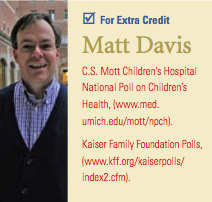Want to know what the nation thinks about childhood obesity, bullying, or genetic risk testing? Ask Dr. Matthew Davis, an associate professor at the Ford School and the Medical School. As director of the C.S. Mott Children's Hospital National Poll on Children's Health, he and his team have reported on dozens of timely and often policy-relevant topics to gauge parents' experience with and opinions about current trends and issues in children's health and health policy.
 |
|
Matt Davis |
Davis collects a wealth of information from the adults he surveys, some of it surprising. For instance, while obesity, smoking, and drug use are the child health problems consistently of greatest concern to adults in the U.S., Internet safety and bullying are also among the 10 most commonly identified problems in neighborhoods across the country. Asthma, autism, and cancer rank well below these issues in terms of overall levels of public concern.
Davis and his colleagues frequently share this data with lawmakers and opinion leaders in an effort to provide public perspectives on timely issues. In the past, policymakers have used the poll findings to inform their legislative plans—dropping a requirement to vaccinate middle and high-school girls against the relatively low-risk human papillomavirus (HPV) and electing to regulate electronic cigarettes that provide nicotine in an aerosol form, for example.
Poll findings also regularly contribute to the broader public dialogue on children's health and health policy. In the last year alone, Davis's poll has been referenced in USA Today, TIME, the Los Angeles Times, the New York Times, the Washington Post, Health Daily, Reuters, WebMD, and National Public Radio broadcasts.
"It's absolutely critical to hear and consider what the public is thinking about children's health issues," says Davis. "Experts are smart. Policymakers can be well-intentioned. But I believe that knowing what the public thinks and what initiatives they would support is an important element in crafting sound public policy."
Upcoming surveys will focus on gun safety and violence, teen pregnancy, and opinions about the perceived reliability of a variety of health information sources. Ideas for future polls? Email Davis and his poll team at [email protected].
Below is a formatted version of this article from State & Hill, the magazine of the Ford School. View the entire Fall 2010 State & Hill here.
